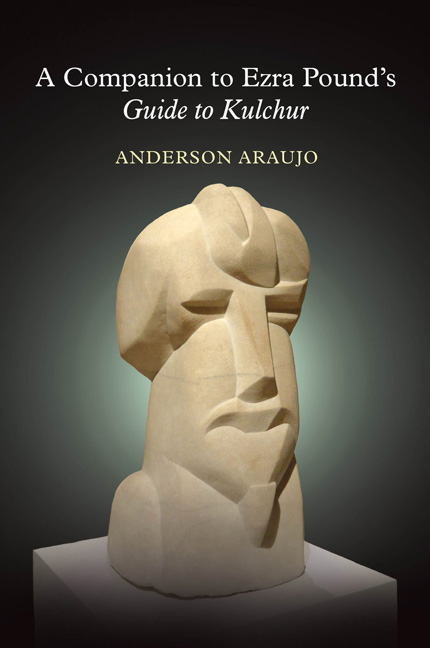Book contents
- Frontmatter
- Contents
- Acknowledgments
- Abbreviations
- Introduction
- Guide to Kulchur
- Part I
- Section I
- Section II
- Part II
- Section III
- Section IV
- Part III
- Section V
- Section VI
- Part IV
- Section VII
- Section VIII
- Section IV
- Part V
- Section X
- Section XI
- Part VI
- Section XII
- 53 Study Of Physiognomy
- 54 And Therefore Tending
- 55 Pergamena Deest
- 56 Watch The Beaneries
- Section XIII
- Addenda: 1952
- Notes
- Index
54 - And Therefore Tending
from Section XII
- Frontmatter
- Contents
- Acknowledgments
- Abbreviations
- Introduction
- Guide to Kulchur
- Part I
- Section I
- Section II
- Part II
- Section III
- Section IV
- Part III
- Section V
- Section VI
- Part IV
- Section VII
- Section VIII
- Section IV
- Part V
- Section X
- Section XI
- Part VI
- Section XII
- 53 Study Of Physiognomy
- 54 And Therefore Tending
- 55 Pergamena Deest
- 56 Watch The Beaneries
- Section XIII
- Addenda: 1952
- Notes
- Index
Summary
Novum Organum … Bacon found Aristotle unsatisfactory: Originally written in Latin by the English Renaissance philosopher Francis Bacon (1561–1626), Novum Organum (1620) ambitiously aimed to offer nothing less than “True Directions for the Interpretation of Nature,” as boasted in the book's subtitle. Although it takes its title from Aristotle's logical treatise, Organum, Bacon's work purports to supplant it. As Pound suggests, Bacon rejects Aristotle's dialectical arguments and syllogistic method of reasoning. For Bacon, Aristotle “utterly enslaved his natural philosophy to his logic, and made it a matter of disputation and almost useless.”
Nichomachean Ethics … tavola rasa: Aristotle's magnum opus on moral science, the Nicomachean Ethics comprises ten books dedicated to his son Nicomachus and his pupil Eudemus, according to Porphyry, an early commentator. Pound's comment that the treatise “offers a better tavola rasa” (or “blank slate”) must be measured in relation to Confucian philosophy, against which he pits Aristotelian logic and ethics in a less favorable light (cf. note GK 15). Jiyuan Yu aptly sums up the structural differences between the two modes of ethical thinking:
First, there is a distinction between practical wisdom and theoretical wisdom in Aristotle, and the theory of contemplation gives rise to a tension with the theory of practical virtue in the middle books of the Nicomachean Ethics. In contrast, there is no division between practical virtue and theoretical virtue in Confucian ethics.
Pound owned and extensively annotated his copy of the 1934 revised edition of Harris Rackham's translation of the Nicomachean Ethics, first published in 1926.
Paideuma: Cf. note GK 27.
ante Christum: (L.) “before Christ.”
Mr Swabey: Reverend Henry Swabey, a young Anglican minister with whom Pound corresponded about economics and the Church of England in the mid-1930s, as shown in a letter to Swabey of December 19, 1936 concerning the Church Assembly that year (cf. note GK 301) and “the nature of money monopoly, credit and economics.” Swabey edited the Social Credit journal Voice and wrote an unpublished monograph, Usury and the Church of England, citing Aristotle's and Pound's attacks on usury, including the portrayal of usury as “the beast with a hundred legs” in The Cantos (15/64).
- Type
- Chapter
- Information
- A Companion to Ezra Pound's Guide to KulcherGuide to Kulcher, pp. 317 - 351Publisher: Liverpool University PressPrint publication year: 2018

